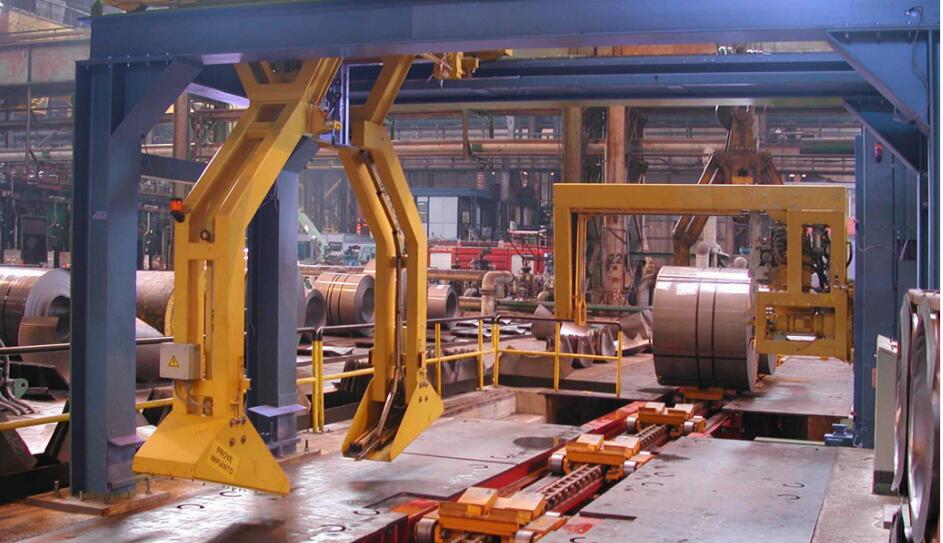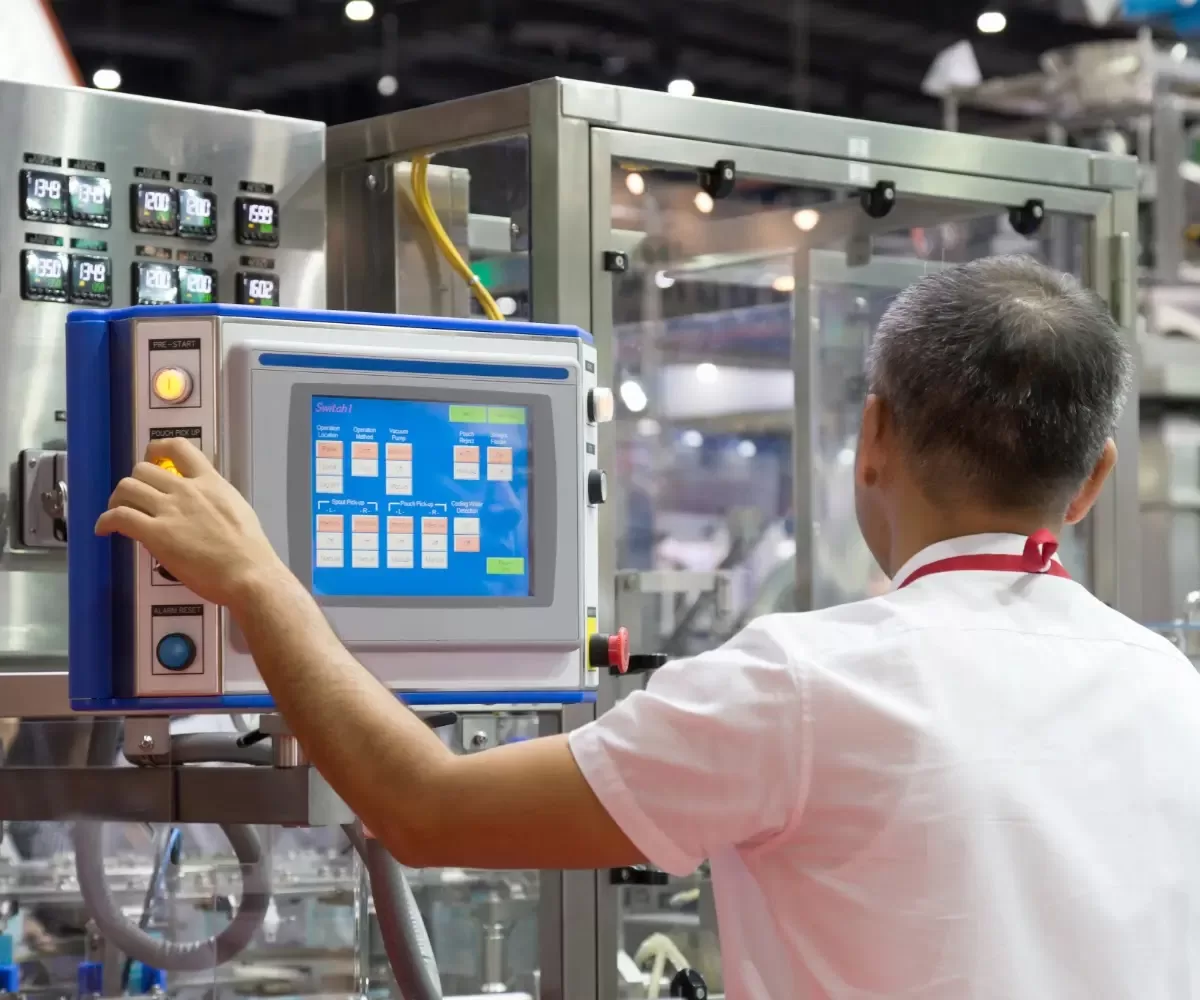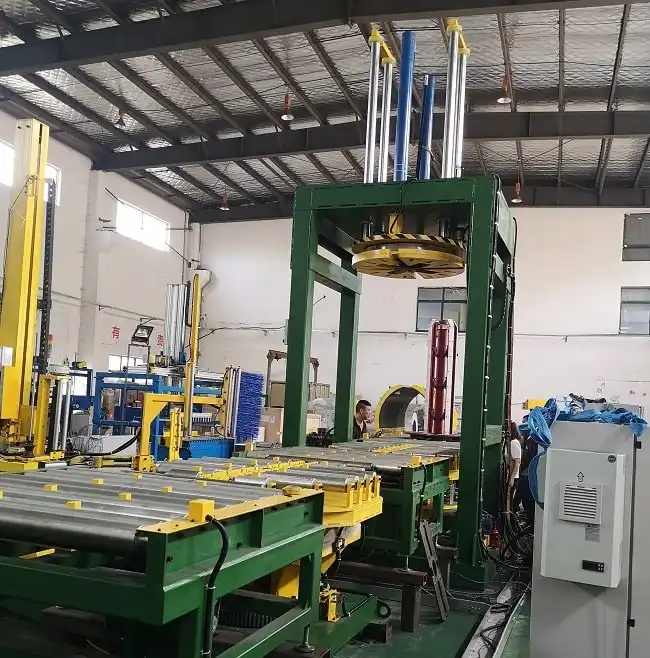Running a steel facility in Turkey is a demanding job. You face constant pressure from fluctuating energy prices, global market shifts, and the need to get your high-quality product out the door safely and on time. Often, the final step in the process—coil wrapping—is an afterthought. But a breakdown or inefficiency here can create a bottleneck that halts your entire production line. It's a source of stress and a hidden drain on your profits. You've worked hard to optimize your melting, casting, and rolling processes. It’s time to give your packaging line the same strategic attention.
To select a reliable coil wrapping system for your Turkish steel facility, you must evaluate the machine's automation level, material efficiency, and a supplier's ability to provide localized technical support. Focus on systems that integrate with your existing lines, offer robust construction for the demanding steel mill environment, and provide a clear path for future upgrades and maintenance.

This might sound straightforward, but the details make all the difference. I've been in the packaging machine industry my whole career, first as an engineer on the factory floor and later as a factory owner myself. I’ve seen firsthand how a poor equipment choice can cost a business millions in downtime and damaged goods. Let’s break down the key questions you need to ask. This will help you make a smart, profitable investment that strengthens your operation for years to come.
How can a new wrapping system address rising energy and operational costs?
Energy bills and maintenance costs are likely eating into your margins. In the steel industry, every kilowatt-hour and every minute of downtime counts. An old, inefficient wrapping machine is a constant financial drain. It uses more power than modern equipment and requires frequent, costly repairs. You see the numbers on your balance sheet every month. The cost of electricity in Turkey can be unpredictable, and your aging equipment just keeps consuming more. You find your team patching it up again and again, but you know it’s a losing battle. This directly fights against your goal to lower overall operational costs.
A new coil wrapping system addresses high costs by incorporating energy-efficient servo motors instead of older hydraulic systems, reducing power consumption by up to 30%. It also minimizes film waste through precise tension control and pre-stretch capabilities. Its robust design also lowers maintenance needs, which directly cuts operational expenses.

The Shift from Power-Hungry Hydraulics to Efficient Servos
Older wrapping machines often rely on hydraulic power packs. These systems are powerful, but they are notoriously inefficient. The hydraulic pump often runs continuously, even when the machine is idle between coils, wasting a tremendous amount of electricity. They are also prone to leaks, which creates a messy work environment and requires regular, costly fluid replacement and disposal.
Modern systems, however, utilize all-electric servo motor technology. Servo motors consume significant power only when they are actively moving. During idle times, their energy consumption is almost zero. This single change can lead to a huge reduction in the machine’s energy footprint. When I was upgrading a line for a client in the automotive sector, we replaced their old hydraulic wrapper. The new servo-driven machine cut the packaging station's energy bill by nearly 40%. It's a direct and immediate saving that shows up on your monthly statements.
Slashing Costs with Smart Material Usage
Stretch film is another significant operational cost. Older machines often have basic or non-existent pre-stretch mechanisms. This means you are using far more film than necessary to secure a coil. A good pre-stretch system can stretch the film by 200-300%. This means one meter of film on the roll becomes three or four meters on the coil. This drastically reduces the amount of film you need to buy.
Furthermore, precise tension control ensures the film is applied with consistent force. This prevents both under-wrapping, which can lead to package failure, and over-wrapping, which wastes material. The system uses exactly the right amount of film, every time. This not only saves money but also improves the quality and consistency of your packed product.
| Feature Comparison | Old Hydraulic System | Modern Servo System |
|---|---|---|
| Energy Consumption | High (pump runs continuously) | Low (power-on-demand) |
| Material Pre-Stretch | 0% - 150% (Often low/inconsistent) | 250% - 300% (Consistent & high) |
| Maintenance Needs | High (oil leaks, filter changes) | Low (fewer moving parts, no oil) |
| Operational Cost | High | Up to 50% Lower |
What technical specifications matter most for long-term reliability and performance?
You have probably bought equipment before that looked great in the brochure but failed under the heavy, non-stop demands of a steel mill. A breakdown on the packing line is just as disruptive as a failure in the rolling mill. It creates a bottleneck that can stop your entire operation. When a machine can't keep up with your production pace, your targets are at risk. Constant tinkering and unexpected failures damage your team's morale and your plant's overall uptime. You are aiming for 95% availability, and a weak link in your final packaging stage makes that goal impossible to reach.
For long-term reliability in a Turkish steel facility, the most critical technical specifications are a heavy-duty frame construction, the use of high-quality, globally recognized components like Siemens or SEW, and a simple, robust mechanical design. You should also ensure the control system is intuitive and offers comprehensive diagnostics to speed up troubleshooting.

The Foundation: Frame and Construction
A steel mill is a tough environment. There's dust, vibration, and heavy loads being moved around constantly. A coil wrapping machine built with a flimsy, lightweight frame will not last. Vibrations from nearby machinery and the wrapping process itself will cause components to misalign and fail prematurely.
Look for a machine built with a heavy-duty, welded steel frame. The thicker the steel, the better it will absorb vibrations and withstand the rigors of the plant floor. When I visit a potential supplier's factory, the first thing I do is knock on the machine's frame. A solid, thick structure is a good sign of quality. It shows the manufacturer understands the environment their machine will operate in. This robust foundation is the number one factor for ensuring mechanical longevity and reducing the need for constant realignment and repairs.
The Heartbeat: Quality Components
A machine is only as strong as its weakest part. It is critical that the core components—motors, gearboxes, bearings, and electronics—are from reputable, globally recognized brands. For a facility in Turkey, using brands like Siemens, SEW-Eurodrive, or Schneider Electric is a huge advantage. These brands are known for their reliability. More importantly, their spare parts and technical support are readily available within Turkey and across Europe.
If you choose a machine with obscure or no-name components, you are taking a big risk. When a motor or sensor fails, you could be waiting weeks for a replacement part to be shipped from overseas. That's weeks of downtime for a single, small component. Insisting on high-quality, locally supported components is a simple way to protect your investment and guarantee uptime.
The Brain: Control System and Diagnostics
The control system, typically a PLC (Programmable Logic Controller), is the brain of the operation. A well-designed system is easy for your operators to use. It should have a clear HMI (Human-Machine Interface) screen with intuitive controls and multiple language options, including Turkish.
But more than that, a good control system is a powerful maintenance tool. It should have a detailed diagnostics screen that tells your maintenance team exactly what is wrong when a fault occurs. Instead of spending hours guessing, a technician can look at the screen and see "Fault at Sensor 3B" or "Motor Overload on Ring Drive." This turns a multi-hour troubleshooting job into a 15-minute fix. This feature is essential for achieving a 95% uptime goal and empowering your own team to handle issues quickly.
| Critical Specification | What to Look For | Why It Matters for a Turkish Steel Mill |
|---|---|---|
| Frame | Heavy-duty, welded steel plate (not tube) | Withstands vibration and harsh plant environment. |
| Motors/Drives | Siemens, SEW, ABB | High reliability and local availability of spares/support. |
| PLC/HMI | Siemens, Allen-Bradley | Robust, easy to integrate, and familiar to local technicians. |
| Bearings | SKF, FAG, NSK | High-quality bearings last longer, reducing unplanned downtime. |
| Diagnostics | Detailed fault-finding on HMI screen | Drastically reduces troubleshooting time for your maintenance staff. |
How does the right supplier support digitalization and environmental compliance?
You have a vision for a smart factory. A plant where all systems are connected and you have a clear view of your entire operation in real-time. At the same time, you know that environmental regulations in Turkey and for your export markets are becoming stricter. Your next equipment purchase must support both of these goals. It cannot be another isolated island of technology that doesn't talk to your other systems. Buying a machine that can't communicate with your MES or ERP system creates data silos and forces your team into manual data entry. This holds back your digital transformation. And if the machine is wasteful, you risk higher costs and potential issues with compliance.
A strategic supplier supports digitalization by providing wrapping systems with open communication protocols, like Profinet or OPC-UA, that easily integrate with your plant's Manufacturing Execution System (MES). For environmental compliance, they offer solutions that minimize packaging waste, reduce energy consumption, and can handle more sustainable packaging materials.

Connecting Your Factory: Data Integration is Key
Your goal to digitize your factory depends on data. You need to know how many coils are packed per hour, the packaging material consumption for each one, and any machine stoppages. A modern coil wrapper should be able to provide this data automatically. To do this, it needs to connect seamlessly with your higher-level plant management systems, like an MES.
Ask potential suppliers if their machines support standard industrial communication protocols like Profinet, Ethernet/IP, or OPC-UA. These are like common languages that allow different machines to talk to each other. With this connection, the wrapping machine can receive coil data (ID, dimensions) directly from your production line, eliminating manual entry and errors. It can then send back real-time status updates, production counts, and alarm histories. This level of data visibility is the foundation of a smart factory. It allows you to monitor performance, identify bottlenecks, and make data-driven decisions to improve efficiency.
The Power of IoT and Predictive Maintenance
Digitalization goes beyond simple data exchange. Modern wrappers can be equipped with IoT sensors to monitor the health of critical components in real-time. For example, sensors can track motor temperature, vibration levels, and power consumption. By analyzing this data over time, the system can predict when a component is likely to fail.
This supports your goal of implementing predictive maintenance. Instead of waiting for a bearing to break and stop the line unexpectedly, you get an alert weeks in advance: "Vibration on ring drive bearing is high. Schedule replacement." This allows you to plan maintenance during a scheduled shutdown, maximizing your uptime and moving you closer to that 95% availability target. It transforms maintenance from a reactive fire-fight into a proactive, planned activity.
| Digital & Green Feature | Benefit for Digitalization | Benefit for Environment & Cost |
|---|---|---|
| MES/ERP Integration | Real-time production tracking, no manual data entry | Tracks material usage per coil for cost analysis |
| IoT-Ready Sensors | Enables predictive maintenance, reduces unplanned downtime | Monitors energy consumption for efficiency improvements |
| High Pre-Stretch Unit | - | Reduces plastic film consumption by up to 70% |
| Servo-Electric Motors | Provides precise performance data | Lowers electricity consumption by over 30% vs. hydraulic |
What should you look for in a supplier beyond the machine itself?
I'm sure you have experienced this before. The sales pitch was great and the price was right. But after the machine was installed, the supplier seemed to disappear. When you have a problem, you are on your own. You struggle to find spare parts or get a qualified technician to your site. This is a nightmare scenario for any plant manager, especially in a 24/7 operation like a steel mill. A machine is only as good as the support structure behind it. Without a true partner, a minor technical issue can turn into days of lost production and immense frustration. You are not just buying steel and electronics; you are buying a long-term relationship.
Beyond the machine, look for a supplier with proven experience in the heavy-duty steel industry, a strong local or regional support presence for Turkey, and a comprehensive after-sales service package. This package must include readily available spare parts, remote diagnostic capabilities, and a clear training program for your operators and maintenance staff.

The Critical Importance of Local and Remote Support
When your line is down, you need help immediately. A supplier based halfway around the world with no local presence is a major liability. The time difference, language barriers, and shipping delays for parts can turn a simple fix into a week-long shutdown.
Before you choose a supplier, ask them hard questions about their support structure for Turkey. Do they have trained technicians in the region? Can they provide support in Turkish? How quickly can they get spare parts to your facility? A strong supplier will have a clear plan for this. They should also offer remote diagnostic capabilities. With your permission, their engineers can log into your machine’s PLC from their office to troubleshoot problems in real-time. Many issues can be solved this way in minutes, without needing to wait for a technician to travel to your site. This combination of local presence and remote capability is the gold standard for after-sales support.
Expertise That Matters: Do They Understand Steel?
The packaging needs of a steel mill are completely different from those of a food or pharmaceutical company. The environment is harsh, the products are heavy, and the demands on the equipment are relentless. A supplier who primarily serves light industries will not understand these challenges. Their equipment will not be built to last.
This is where my own journey comes in. I started on the factory floor. I know what it’s like to run these machines day in and day out. I built my own company, SHJLPACK, based on that practical experience. We design machines specifically for industries like steel and aluminum. Look for a supplier with a long list of successful installations in other steel mills. Ask for references. A supplier who understands your business is more than a vendor; they are a partner who can offer valuable advice and build a solution that truly meets your needs.
Training That Empowers Your Team
A great supplier doesn't just install a machine and leave. They empower your team to be self-sufficient. A comprehensive training program is not an optional extra; it is essential. The training should cover not just basic operation for your line workers, but also mechanical and electrical maintenance for your technical staff. Your team should learn how to perform routine maintenance, troubleshoot common faults, and understand the control system. This investment in training pays for itself quickly. It reduces your reliance on the supplier for minor issues and gives your team the confidence and skills to keep the line running smoothly.
| Supplier Evaluation | What to Look For | Red Flags to Avoid |
|---|---|---|
| Industry Experience | Many successful projects in steel mills. | Primarily serves light industries (food, pharma). |
| Local Support | Technicians in Turkey or the region. Turkish language support. | Support is only available from a distant head office. |
| Spare Parts | A list of critical spares and guaranteed local stock. | Vague promises about parts availability. |
| Training | In-depth, hands-on training for operators & maintenance. | A quick one-hour overview after installation. |
| Partnership Attitude | Asks detailed questions about your process and goals. | Focuses only on the price and machine features. |
Conclusion
Choosing a coil wrapper is a strategic decision for your Turkish steel facility. Focus on total cost, long-term reliability, and finding a supportive partner to secure your plant's future success.




